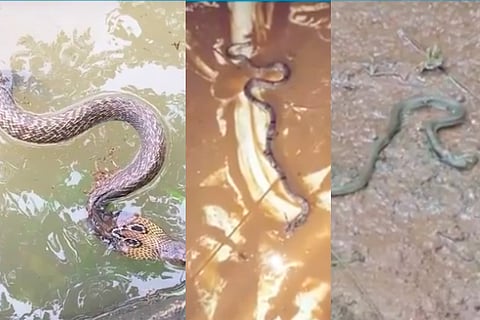Kerala floods: Receding waters leave behind snakes in houses
Within three days of the flood waters receding in several parts of Kerala, the Angamaly Little Flower Hospital saw 53 patients, all admitted after sustaining snake bites.
“We usually only get 300 odd cases in a year. In three-four days alone we have got 53 cases,” Dr Joseph K Joseph, an anti-venom expert in Little Flower told Mathrubhumi News.
The patients admitted were from different regions of flood-hit Kerala such as Ernakulam, Vypin, Vadakara and Paravur. Out of the 53 cases, most suffered snake bites while they were cleaning their homes after the water had receded, and most of them sustained bites from vipers.
The state has recorded an increase in the number of snake bite cases due to the flood waters leaving behind reptiles, scorpions, centipedes and worms in houses that were water-logged. And doctors predict that this number is set to increase as more people shift from relief camps and clear out their houses.
Several snakes, both dead and alive, are being discovered in the flood ravaged houses. Further, most snakes typically seen in the coastal region were found to be dead.
In Meppayur, a town in Kozhikode, a 10 foot long python weighing 32 kilos was reportedly found under the bonnet of a car on Monday. The car was parked in the house of Keezhariyur resident Abdul Salaam who had been trying to start the engine after the rains let up. The house, located 250 metres from the Nelliyadi river, had been safe from floods. On opening the bonnet, Salaam reportedly found the python inside. The reptile was later taken away by forest department officials and will be kept with the department for 20 days before being released into the dense Muthanga forests in Wayanad district, according to reports.
In Aluva, 35 snakes were found inside a house located in Desam Kavala. The family residing in the house had reunited after 5 days of separation due to floods, only to go back to a house full of snakes.
Doctors have issued warnings to those shifting back home to watch out for snakes while spring-cleaning their houses.
The months of June and July (monsoons) are the breeding season for vipers, cobras and other reptiles. In one cycle, a viper can lay up to 60 eggs and cobras 30. All vipers, including the babies, have a concentrated amount of venom in their bites. Cobras are great swimmers and can mover quickly in water.
What to do to avoid snake bites:
- Use sticks and beat it around while entering the house to create noise. Snakes cannot see or hear and sense activity through vibrations.
- Do not slide your hands into shoe holes or other tiny openings without checking them first.
What to do after a snake bite:
- If you’re bitten by a snake, take care to not move. Do not panic and let your heart race. Do not move, walk, run or do any activity that can increase your pulse rate or blood circulation.
- Tie the affected area with a compressed band-aid to contain its spread. Take care not to tie the area too tight.
- Remove bangles, rings and other jewellery, as the affected area is likely to swell and ornaments will have to be cut and removed.

